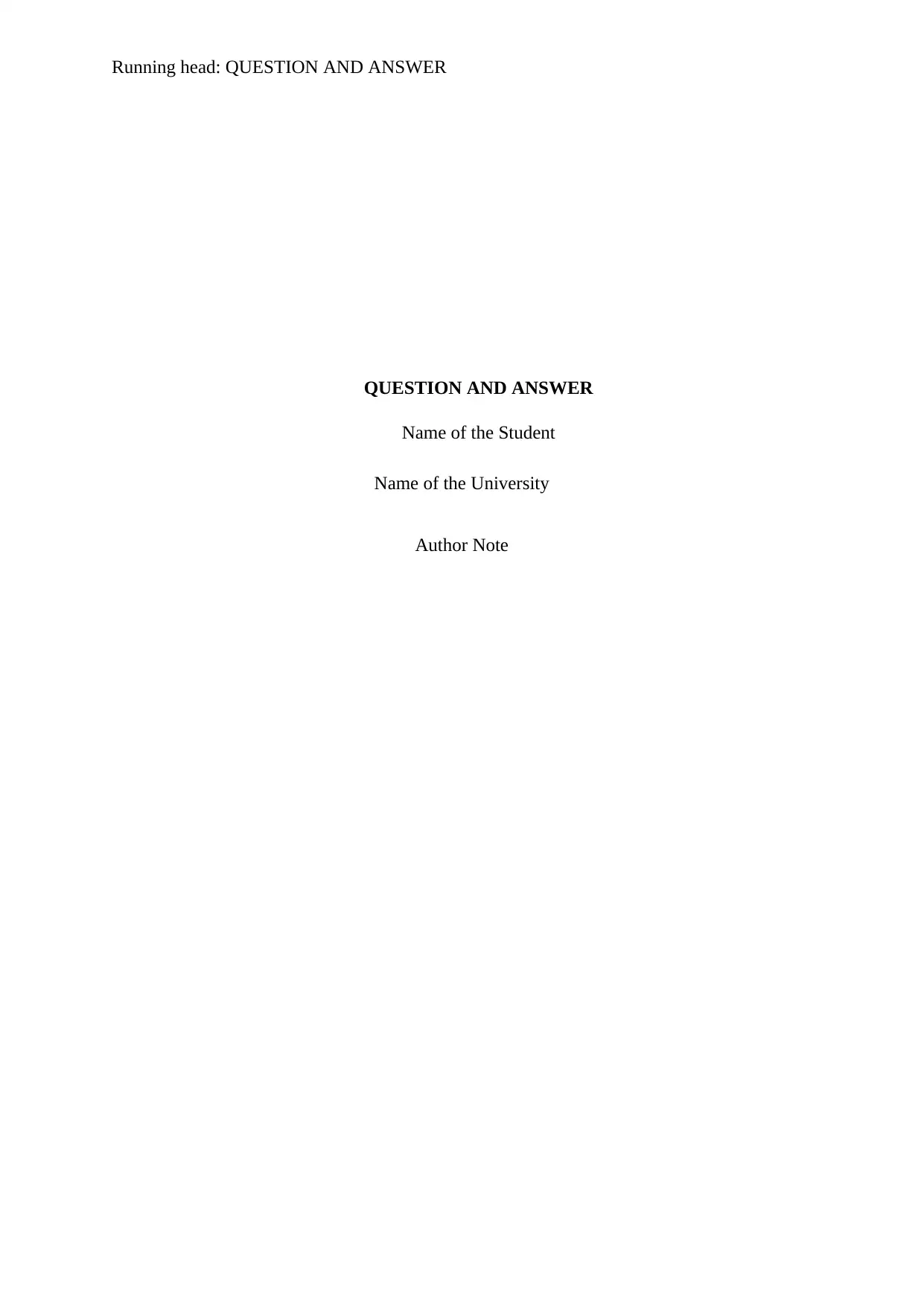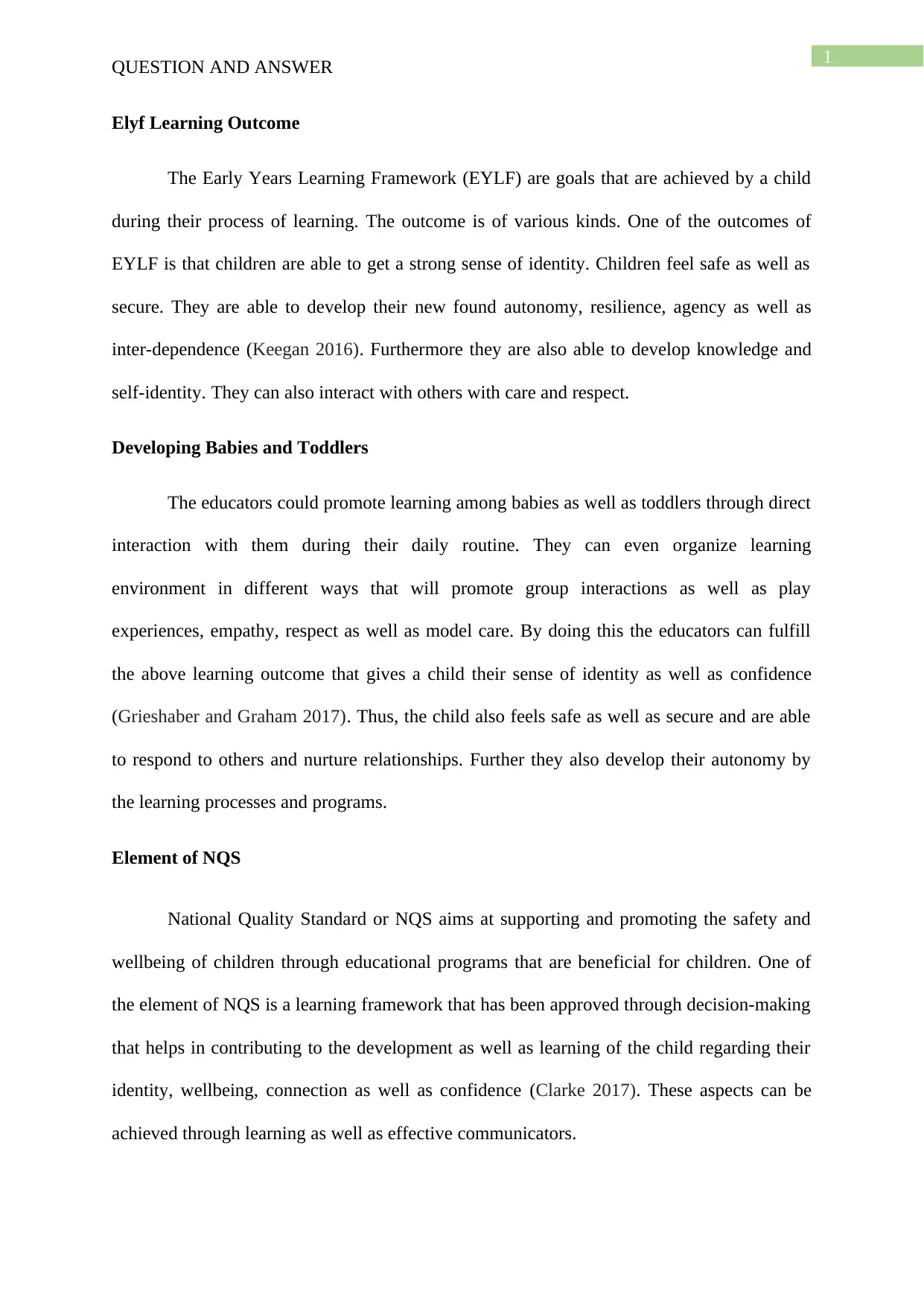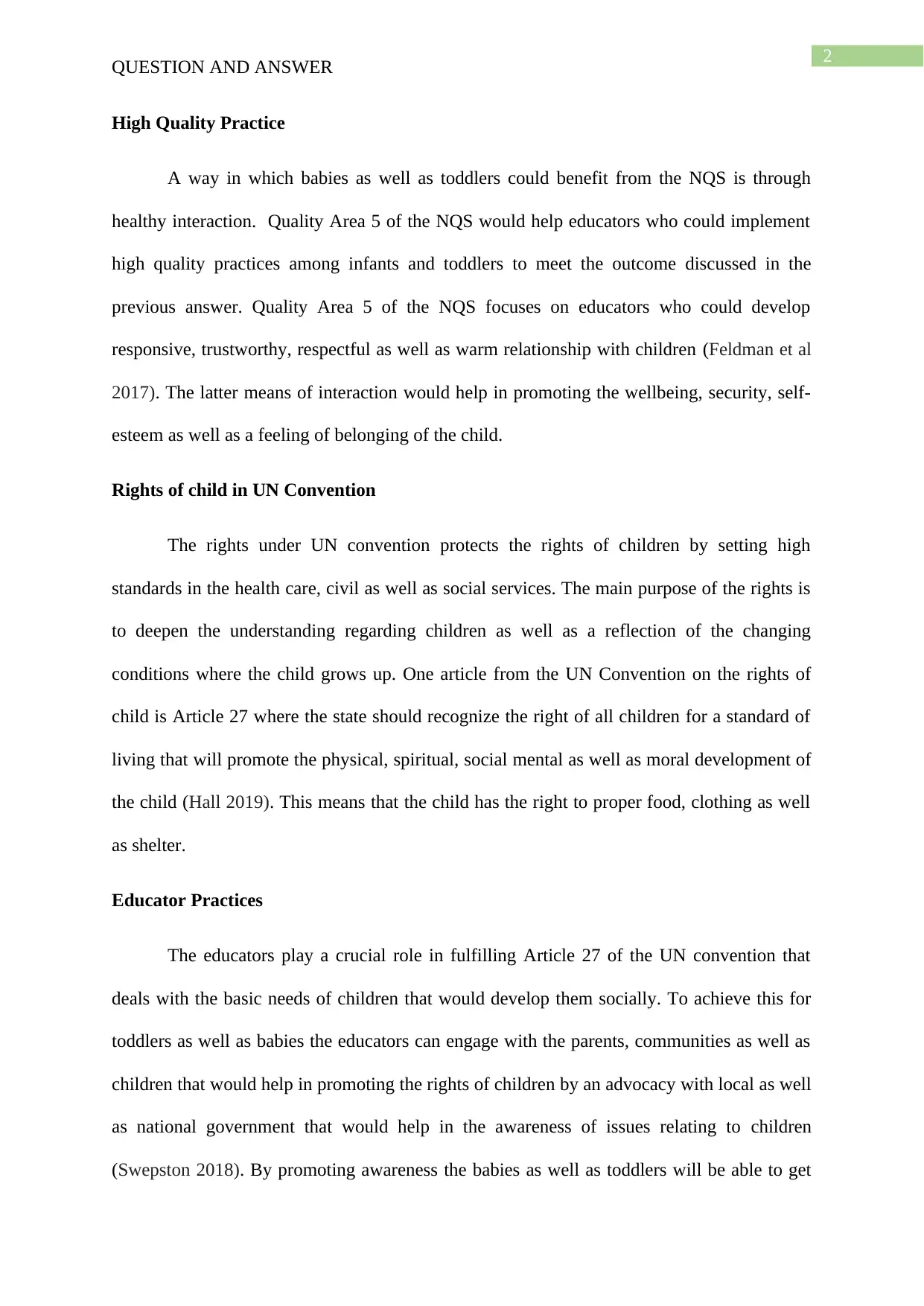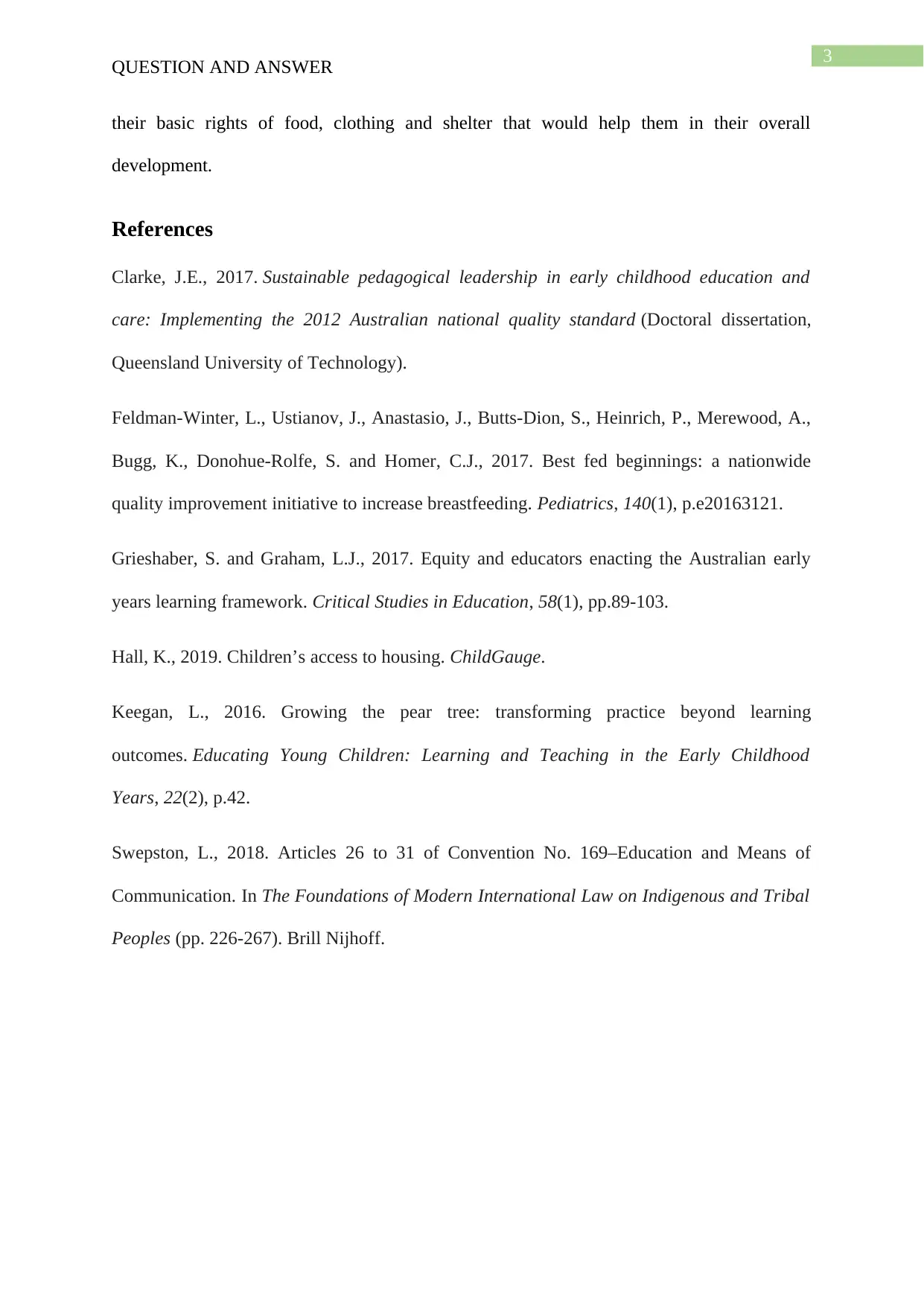Early Years Learning Framework, NQS, and Child Rights Assignment
VerifiedAdded on 2022/08/18
|4
|909
|14
Homework Assignment
AI Summary
This assignment provides a detailed Q&A on the Early Years Learning Framework (EYLF), National Quality Standard (NQS), and the UN Convention on the Rights of the Child. It explores how educators can promote learning and development in babies and toddlers, focusing on the EYLF outcomes, the elements of NQS, and the rights of children as outlined in the UN Convention, particularly Article 27. The assignment addresses how educators can foster a strong sense of identity, safety, security, autonomy, and respect in children. It also highlights the importance of high-quality practices and the role educators play in fulfilling children's basic needs. The solution references key concepts and provides practical examples of how educators can support children's development and well-being through interaction with the children, parents, and community.

Running head: QUESTION AND ANSWER
QUESTION AND ANSWER
Name of the Student
Name of the University
Author Note
QUESTION AND ANSWER
Name of the Student
Name of the University
Author Note
Paraphrase This Document
Need a fresh take? Get an instant paraphrase of this document with our AI Paraphraser

1
QUESTION AND ANSWER
Elyf Learning Outcome
The Early Years Learning Framework (EYLF) are goals that are achieved by a child
during their process of learning. The outcome is of various kinds. One of the outcomes of
EYLF is that children are able to get a strong sense of identity. Children feel safe as well as
secure. They are able to develop their new found autonomy, resilience, agency as well as
inter-dependence (Keegan 2016). Furthermore they are also able to develop knowledge and
self-identity. They can also interact with others with care and respect.
Developing Babies and Toddlers
The educators could promote learning among babies as well as toddlers through direct
interaction with them during their daily routine. They can even organize learning
environment in different ways that will promote group interactions as well as play
experiences, empathy, respect as well as model care. By doing this the educators can fulfill
the above learning outcome that gives a child their sense of identity as well as confidence
(Grieshaber and Graham 2017). Thus, the child also feels safe as well as secure and are able
to respond to others and nurture relationships. Further they also develop their autonomy by
the learning processes and programs.
Element of NQS
National Quality Standard or NQS aims at supporting and promoting the safety and
wellbeing of children through educational programs that are beneficial for children. One of
the element of NQS is a learning framework that has been approved through decision-making
that helps in contributing to the development as well as learning of the child regarding their
identity, wellbeing, connection as well as confidence (Clarke 2017). These aspects can be
achieved through learning as well as effective communicators.
QUESTION AND ANSWER
Elyf Learning Outcome
The Early Years Learning Framework (EYLF) are goals that are achieved by a child
during their process of learning. The outcome is of various kinds. One of the outcomes of
EYLF is that children are able to get a strong sense of identity. Children feel safe as well as
secure. They are able to develop their new found autonomy, resilience, agency as well as
inter-dependence (Keegan 2016). Furthermore they are also able to develop knowledge and
self-identity. They can also interact with others with care and respect.
Developing Babies and Toddlers
The educators could promote learning among babies as well as toddlers through direct
interaction with them during their daily routine. They can even organize learning
environment in different ways that will promote group interactions as well as play
experiences, empathy, respect as well as model care. By doing this the educators can fulfill
the above learning outcome that gives a child their sense of identity as well as confidence
(Grieshaber and Graham 2017). Thus, the child also feels safe as well as secure and are able
to respond to others and nurture relationships. Further they also develop their autonomy by
the learning processes and programs.
Element of NQS
National Quality Standard or NQS aims at supporting and promoting the safety and
wellbeing of children through educational programs that are beneficial for children. One of
the element of NQS is a learning framework that has been approved through decision-making
that helps in contributing to the development as well as learning of the child regarding their
identity, wellbeing, connection as well as confidence (Clarke 2017). These aspects can be
achieved through learning as well as effective communicators.

2
QUESTION AND ANSWER
High Quality Practice
A way in which babies as well as toddlers could benefit from the NQS is through
healthy interaction. Quality Area 5 of the NQS would help educators who could implement
high quality practices among infants and toddlers to meet the outcome discussed in the
previous answer. Quality Area 5 of the NQS focuses on educators who could develop
responsive, trustworthy, respectful as well as warm relationship with children (Feldman et al
2017). The latter means of interaction would help in promoting the wellbeing, security, self-
esteem as well as a feeling of belonging of the child.
Rights of child in UN Convention
The rights under UN convention protects the rights of children by setting high
standards in the health care, civil as well as social services. The main purpose of the rights is
to deepen the understanding regarding children as well as a reflection of the changing
conditions where the child grows up. One article from the UN Convention on the rights of
child is Article 27 where the state should recognize the right of all children for a standard of
living that will promote the physical, spiritual, social mental as well as moral development of
the child (Hall 2019). This means that the child has the right to proper food, clothing as well
as shelter.
Educator Practices
The educators play a crucial role in fulfilling Article 27 of the UN convention that
deals with the basic needs of children that would develop them socially. To achieve this for
toddlers as well as babies the educators can engage with the parents, communities as well as
children that would help in promoting the rights of children by an advocacy with local as well
as national government that would help in the awareness of issues relating to children
(Swepston 2018). By promoting awareness the babies as well as toddlers will be able to get
QUESTION AND ANSWER
High Quality Practice
A way in which babies as well as toddlers could benefit from the NQS is through
healthy interaction. Quality Area 5 of the NQS would help educators who could implement
high quality practices among infants and toddlers to meet the outcome discussed in the
previous answer. Quality Area 5 of the NQS focuses on educators who could develop
responsive, trustworthy, respectful as well as warm relationship with children (Feldman et al
2017). The latter means of interaction would help in promoting the wellbeing, security, self-
esteem as well as a feeling of belonging of the child.
Rights of child in UN Convention
The rights under UN convention protects the rights of children by setting high
standards in the health care, civil as well as social services. The main purpose of the rights is
to deepen the understanding regarding children as well as a reflection of the changing
conditions where the child grows up. One article from the UN Convention on the rights of
child is Article 27 where the state should recognize the right of all children for a standard of
living that will promote the physical, spiritual, social mental as well as moral development of
the child (Hall 2019). This means that the child has the right to proper food, clothing as well
as shelter.
Educator Practices
The educators play a crucial role in fulfilling Article 27 of the UN convention that
deals with the basic needs of children that would develop them socially. To achieve this for
toddlers as well as babies the educators can engage with the parents, communities as well as
children that would help in promoting the rights of children by an advocacy with local as well
as national government that would help in the awareness of issues relating to children
(Swepston 2018). By promoting awareness the babies as well as toddlers will be able to get
⊘ This is a preview!⊘
Do you want full access?
Subscribe today to unlock all pages.

Trusted by 1+ million students worldwide

3
QUESTION AND ANSWER
their basic rights of food, clothing and shelter that would help them in their overall
development.
References
Clarke, J.E., 2017. Sustainable pedagogical leadership in early childhood education and
care: Implementing the 2012 Australian national quality standard (Doctoral dissertation,
Queensland University of Technology).
Feldman-Winter, L., Ustianov, J., Anastasio, J., Butts-Dion, S., Heinrich, P., Merewood, A.,
Bugg, K., Donohue-Rolfe, S. and Homer, C.J., 2017. Best fed beginnings: a nationwide
quality improvement initiative to increase breastfeeding. Pediatrics, 140(1), p.e20163121.
Grieshaber, S. and Graham, L.J., 2017. Equity and educators enacting the Australian early
years learning framework. Critical Studies in Education, 58(1), pp.89-103.
Hall, K., 2019. Children’s access to housing. ChildGauge.
Keegan, L., 2016. Growing the pear tree: transforming practice beyond learning
outcomes. Educating Young Children: Learning and Teaching in the Early Childhood
Years, 22(2), p.42.
Swepston, L., 2018. Articles 26 to 31 of Convention No. 169–Education and Means of
Communication. In The Foundations of Modern International Law on Indigenous and Tribal
Peoples (pp. 226-267). Brill Nijhoff.
QUESTION AND ANSWER
their basic rights of food, clothing and shelter that would help them in their overall
development.
References
Clarke, J.E., 2017. Sustainable pedagogical leadership in early childhood education and
care: Implementing the 2012 Australian national quality standard (Doctoral dissertation,
Queensland University of Technology).
Feldman-Winter, L., Ustianov, J., Anastasio, J., Butts-Dion, S., Heinrich, P., Merewood, A.,
Bugg, K., Donohue-Rolfe, S. and Homer, C.J., 2017. Best fed beginnings: a nationwide
quality improvement initiative to increase breastfeeding. Pediatrics, 140(1), p.e20163121.
Grieshaber, S. and Graham, L.J., 2017. Equity and educators enacting the Australian early
years learning framework. Critical Studies in Education, 58(1), pp.89-103.
Hall, K., 2019. Children’s access to housing. ChildGauge.
Keegan, L., 2016. Growing the pear tree: transforming practice beyond learning
outcomes. Educating Young Children: Learning and Teaching in the Early Childhood
Years, 22(2), p.42.
Swepston, L., 2018. Articles 26 to 31 of Convention No. 169–Education and Means of
Communication. In The Foundations of Modern International Law on Indigenous and Tribal
Peoples (pp. 226-267). Brill Nijhoff.
1 out of 4
Related Documents
Your All-in-One AI-Powered Toolkit for Academic Success.
+13062052269
info@desklib.com
Available 24*7 on WhatsApp / Email
![[object Object]](/_next/static/media/star-bottom.7253800d.svg)
Unlock your academic potential
Copyright © 2020–2026 A2Z Services. All Rights Reserved. Developed and managed by ZUCOL.





